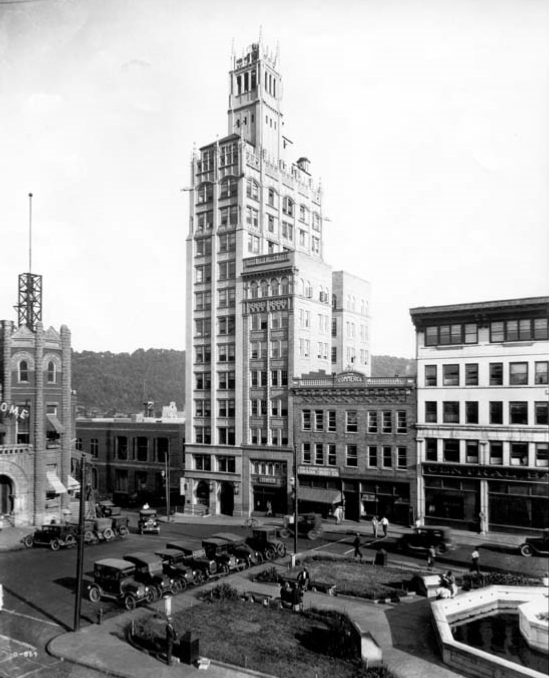On Nov. 21, 1930, The Asheville Citizen offered its readers reassurance, following the unexpected closure of the Central Bank and Trust Co. — the city’s largest financial institution — the previous day.
“Asheville is well past the crisis of the stormy financial situation precipitated early yesterday morning, and clear skies are in sight for today,” the paper insisted.
Among the sources of hope, the article pointed to the arrival of an armored truck with over a million dollars sent by way of the Federal Reserve branch bank in Charlotte.
Additionally, the paper reported:
“A mass of nearly 2,000 citizens of West Asheville, gathered to express their confidence in the officials of the Bank of West Asheville, and to pledge additional financial support by a splendid demonstration of enthusiasm, and indications were that the situation west of the river will be quiet and confident this morning, with no trouble of any kind in sight.”
Of course, the Central Bank was not alone in its misfortune. According to historian Nan K. Chase’s 2007 book, Asheville: A History, 10 additional banks in WNC closed on Nov. 20, 1930.
Nevertheless, additional reports in the Nov. 21 edition of the paper continued to accentuate the positive.
“The factors that have brought Asheville up from a straggling mountain village to the city it is today will continue to operate and as they operate the growth of the city and section will repair the wounds of the present,” an editorial declared. “The capacity of a vigorous young community like this to withstand punishment is almost unbelievable. Such punishment will indeed leave the community stronger and better for its experience.”
By Nov. 22, the optimism remained strong, though it took on a more critical tone from state officials brought in to investigate the cause of the closures.
John Mitchell, whom the paper identified as the chief examiner of the state banking department, declared that eight of the 11 banks “closed unnecessarily on account of public hysteria.”
Mitchell continued, “When people no longer believe in themselves, their neighbors and their associates, they need not expect their local institutions to survive this lack of confidence.”
Accompanying Mitchell was one I.M. Bailey, identified by the paper as counsel for the corporation commission. Like the previous day’s editorials, Bailey offered positive spin, noting that the people of Asheville would rebound after “taking it on the chin.”
The article paraphrased Bailey’s final remarks, which echoed Mitchell’s own words:
“[A] local bank is simply one group of neighbors placing money in an institution to be loaned to another group of neighbors, [Bailey] pointed out, and such a condition should not be affected by financial disturbances outside the community, where this confidence between neighbors and associates is maintained.”
Despite early efforts to talk the city out of financial ruin, Asheville’s outlook did not improve. With the Central Bank’s closure, the city lost nearly $4.6 million in deposits, with the county losing an additional $3 million and the school system down $400,000.
By 1931, legal proceedings against the Central Bank began. In response to the investigation, the bank’s vice president, James E. Rankin, committed suicide. Shortly thereafter, Gallatin Roberts, the mayor at the time of the bank’s closure, also took his own life.
In an April 21, 1935, article featured in Asheville Citizen Times, Wallace B. Davis — the former president of the defunct bank, who served 2 ½ years in prison for violating banking laws — spoke with the paper about the Central Bank’s missteps.
“We made one big mistake, and that was largely my fault,” he declared. “Looking back now, I can see that in trying to protect our loans we were simply sending good money after bad. … We were trying to protect funds which we had already loaned. That was the mistake.”
As Chase notes in her 2007 book, the city would not pay off its Depression-era debt until July 1, 1976.
Editor’s note: Peculiarities of spelling and punctuation are preserved from original documents.




Before you comment
The comments section is here to provide a platform for civil dialogue on the issues we face together as a local community. Xpress is committed to offering this platform for all voices, but when the tone of the discussion gets nasty or strays off topic, we believe many people choose not to participate. Xpress editors are determined to moderate comments to ensure a constructive interchange is maintained. All comments judged not to be in keeping with the spirit of civil discourse will be removed and repeat violators will be banned. See here for our terms of service. Thank you for being part of this effort to promote respectful discussion.